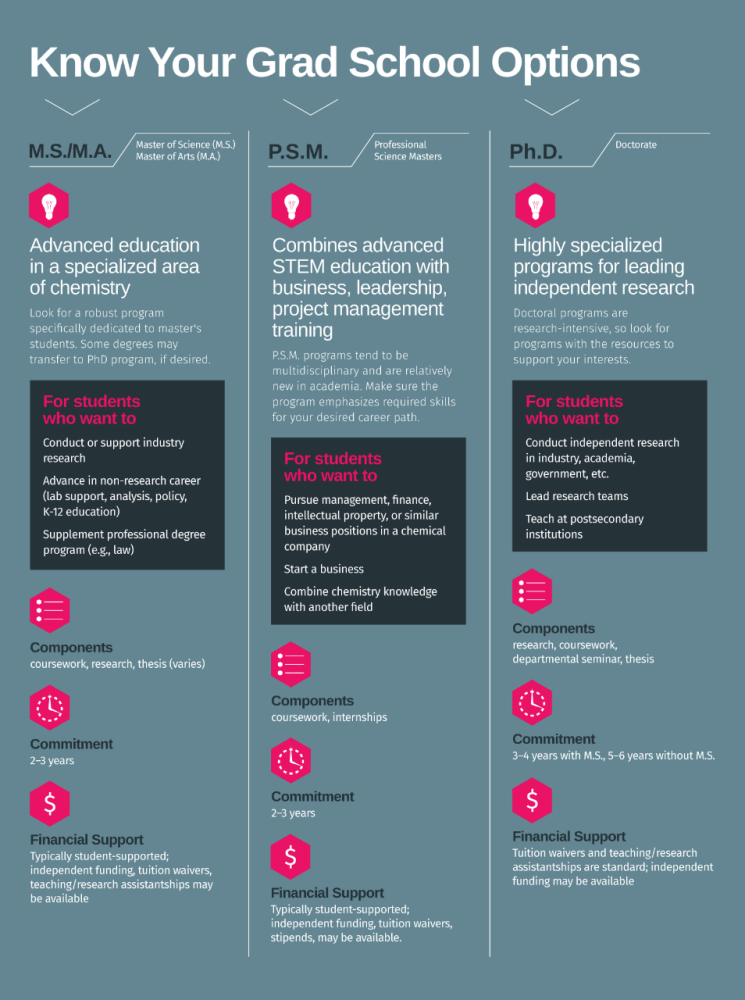A Timeline for Getting Your Graduate School Application Done

Applying to graduate school can seem like a course in itself, according to Sam Pazicni, an assistant professor of chemistry at the University of Wisconsin–Madison who leads a series of workshops about the grad school application process for undergrads. The time and energy it takes to accomplish everything can be challenging on top of a demanding undergraduate class schedule.
Katherine Taylor, a fifth-year PhD candidate in chemical biology at the Massachusetts Institute of Technology, agrees. She admits that she had to pass up some opportunities because she missed deadlines and that starting the application process earlier would have eased her stress level.
Spreading out the load allows ample lead time for things that have their own timelines, such as standardized exams and requesting transcripts and letters of recommendation.
To ensure you take care of your application requirements (and yourself), use the following timeline, working backward from your application deadline, to complete key components of the application in a reasonable time. Keep in mind that some programs have different or additional requirements, so you’ll need to adjust accordingly.
18 months out
Explore potential programs
To ease into the grad school search, keep a running list of what fascinates you, suggests Angela Lee, a graduate student in physical chemistry at MIT who has helped many of her friends through the application process. When you come across a topic or project that piques your interest, make a note. You may get excited about a topic covered in class, an article you read in inChemistry or C&EN, or a speaker you heard at school or at an ACS student chapter event. Whatever you are drawn to, jot it down. If there’s a specific researcher or institution associated with the topic, write that down too. This can help you identify your research interests and where that work is being done, says Lee.
Another important consideration is knowing whether the graduate program aligns with your interests, life situation, and career goals. A doctorate of philosophy (PhD) program is a good choice if you plan to lead your own research team. Other career paths call for a professional science master’s (PSM), terminal master of science or arts (MS or MA), juris doctor degree (JD), or doctor of medicine (MD). Exploring these possibilities can help you narrow down what may feel like too many options.
After Lee narrowed her interests down and decided what degree to pursue, she asked graduate students and researchers in her desired field where to apply. A common set of schools emerged, and that’s where she focused her attention next. Talking with professors, attending colloquia and research symposia (in person or online), browsing resources like inChemistry and Careers & the Chemical Sciences, and watching free online talks are other great ways to narrow down what you want to do and where to apply.
It takes time to identify what programs are likely to be a good match for you and starting the search early gives you lots of room to explore.
When you have an idea of where you want to apply, find out the application deadlines. November is common, but programs may have earlier or later deadlines. Some programs have rolling admissions with no hard deadline, in which case applying earlier is to your advantage.
12 months out
Schedule GREs and English proficiency exams, if necessary
Chemistry graduate programs have traditionally required the Graduate Record Exam (GRE) General Test and the subject-specific GRE Chemistry Test, but many no longer do. Visit program websites to find out if GREs are required before spending your money. If you’re undecided about where to apply, taking the exams could keep more doors open for you. On the other hand, testing starts at $205 with several additional fees (limited financial assistance is available). You can take the general GRE in a testing center or at home most days of the year. The chemistry GRE is only offered in testing centers three times a year—April, September, and October.
Joseph Swain, a graduate student in organic chemistry at Rice University who leads grad school workshops for undergraduates, suggests deciding when to take the GREs and working backward to create a study plan. Opting to take the exam as a junior means you’ll have time to retake it later; however, taking it as a senior maximizes your subject knowledge and gives you more time to study. Swain decided to work for a couple of years after earning his bachelor’s degree, so he took the GREs postgraduation. That's not uncommon either.
US chemistry programs often require international students to take an English proficiency exam such as the TOEFL or IELTS language exam. Both are offered regularly at testing centers and you can also take the TOEFL at home. The cost depends on your location.
When scheduling any standardized test, note that it can take a few weeks or more for your scores to reach programs.
Free GRE preparation resources
6 months out
Decide where to apply
At this point, it's time to get specific. Applications are time-consuming and expensive, so you have to balance that reality with casting a wide net. Applying to four to seven programs ensures that you’ll have options, but don’t waste your time (and money) on programs you aren’t interested in.
A critical but exhaustive part of narrowing down your options is sifting through program websites to identify faculty with whom you might like to work. A general rule of thumb is to apply to programs with at least three faculty members you could envision yourself working with. That's how Christopher Triggs, a graduate student in inorganic materials chemistry at the University of Wisconsin–Madison, culled his list. "I started with a list of 15 schools and in the end narrowed it down to 8 using this method," he says.
Your personal preferences for location, lifestyle, and department culture are important too. If you’re not happy where you end up, it can be challenging to be successful. Investigating these factors takes time but is worthwhile. Your environment should support you and your well-being, not add stress.
5 months out
Get organized
Application packages commonly include online forms, transcripts, a curriculum vitae (CV) or résumé, written essays, GRE and language exam scores, and letters of recommendation. Be kind to your future self and set up a system for tracking your applications, their requirements, and the due dates. Whether you use sticky notes, calendar tasks, checklists, color-coded spreadsheets, or anything else, make sure the system works for you.
4 months out
Draft essays and CV, then solicit feedback
Graduate programs typically require a statement of purpose, also known as a personal statement or cover letter. Programs may provide specific prompts, or request a research statement or a diversity, equity, and inclusion (DEI) statement. These essays aren't mere formalities; they're opportunities to build your personal narrative by demonstrating your potential for success and convincing admissions committees that you're a good match for their program.
If you're working on a fall admissions cycle, Pazicni recommends drafting your essays over the summer. This reduces stress during your busy semester, gives you time to collect feedback and make revisions, and ensures that you have the essays on hand to provide to your letter writers, he says.
CVs are like résumés, but rather than focusing on job history they capture your full academic work, including contributions to teaching, research, service, and awards. A thoughtfully constructed CV or résumé is another way to convey your personal narrative, and seeking feedback on an early draft can help you determine what's most helpful to admissions committees.
"It's very common for students to view the application components as independent check boxes and think that admissions committees rate each of these components somehow to come up with a decision," Pazicni says. "In practice, the admissions committee is using the application components collectively to build evidence-based arguments for criteria that the applicant may not be aware of— like academic potential, alignment with department research interests, and an ability to self-evaluate."
3 months out
Set up portals and complete forms
Graduate school applications are typically submitted through an online application portal. That's where you enter your personal information and history, upload the necessary files, and track whether external documents, like your letters of recommendation, have been received.
Start this step as soon as applications open! Remember, you’ll need to enter your information in multiple portals, and you may need to look up dates or addresses. In addition, you'll probably need to input the email addresses of your letter writers. Many programs communicate with letter writers, so it's essential to do this before your writers get started.
2 months out
Request transcripts, scores, and letters
Institutions may need a few weeks to send your transcripts or scores to programs, so request them early. You can request that GRE and English proficiency scores be sent to specific programs when you register for the exams or after taking them.
Most graduate programs require three letters of recommendation. Be strategic about whom you ask and give them at least six weeks' notice, advises Pazicni. Research advisers, professors, and mentors who can speak to how successful you'll be in graduate school are good choices.
Once you've decided whom to ask, send an email inquiring whether they'd be willing to write a strong letter of recommendation for you. If they agree, provide program and submission details along with your résumé or CV, application essays, and a summary of your interactions (e.g., when you worked with them and your contributions).
Pazicni recommends that applicants also have a short conversation with their letter writers about the narrative they are building in the application and how the letter can support that narrative. "The letters should be able to contribute unique insights that are not redundant with other parts of your application," he says.
1 month out
Add the finishing touches and submit
You're almost there! Now's the time to proofread and upload your essays and other files. Be sure to upload the correct files to each portal, cautions Taylor. Having heard how often students upload personalized statements to the wrong program, she included school name in her file naming system.
Once you've completed everything, take a deep breath and hit submit. In most cases, you don't need to wait until all your letters and other external documents are in to submit your application. But do check the portal periodically in case you need to send reminders to letter writers or troubleshoot other missing elements as the deadline approaches.
Month 0
Take a break
There may be more alternatives to explore and decisions to make, but take some time to relax―you’ve earned it.





